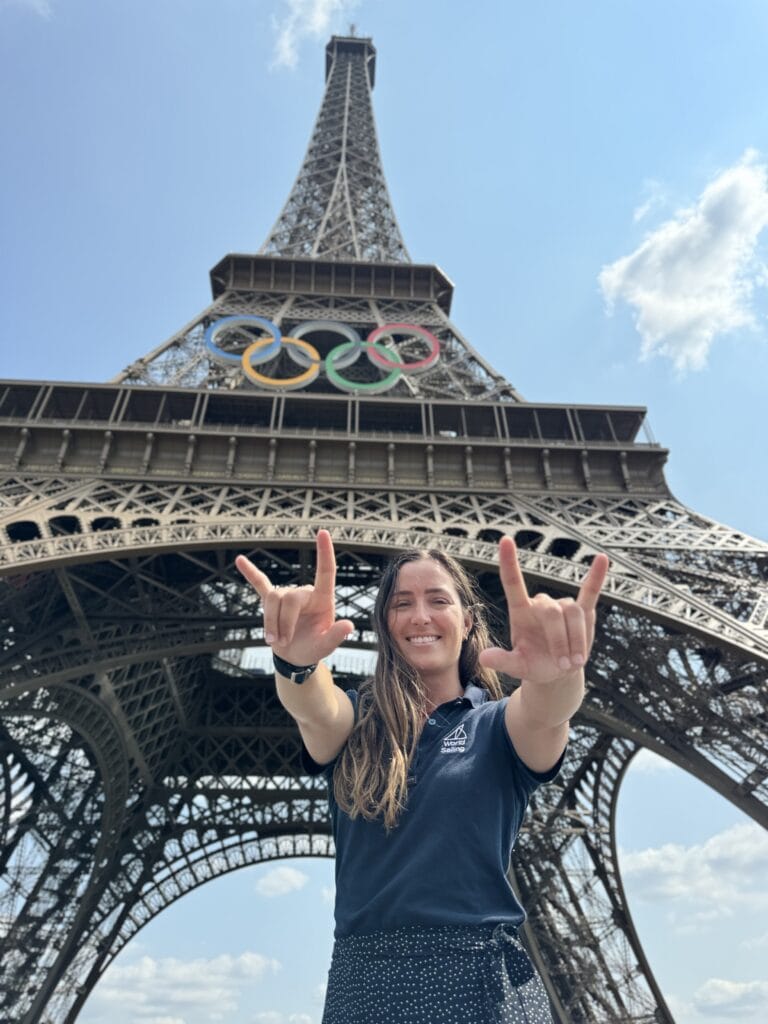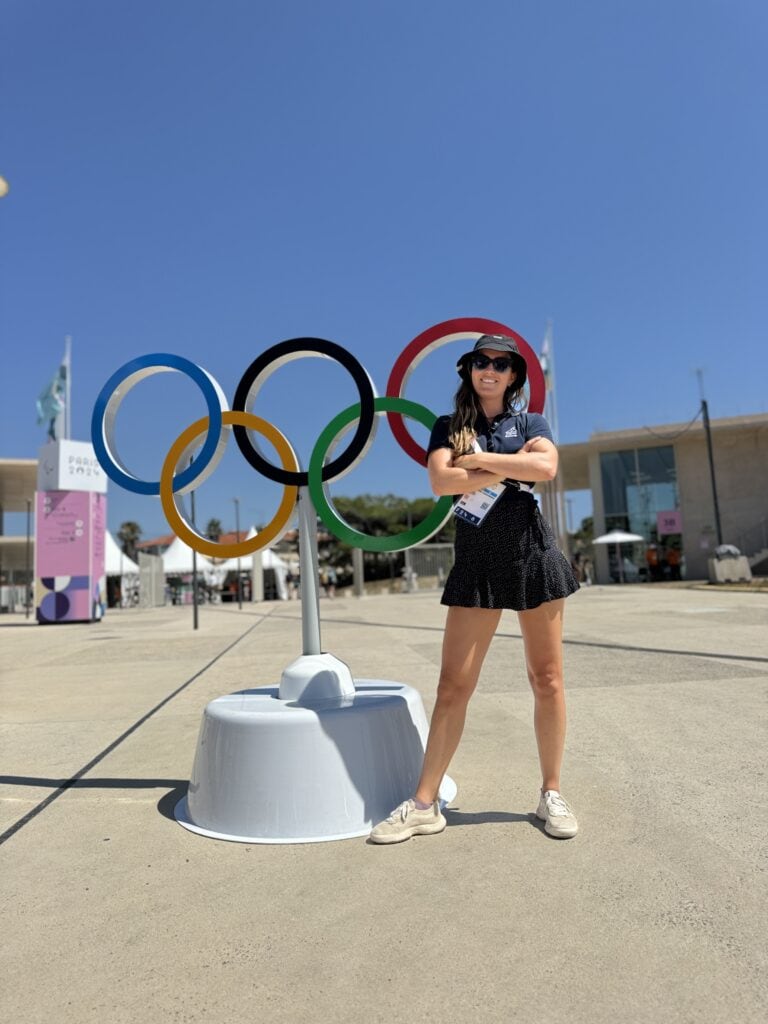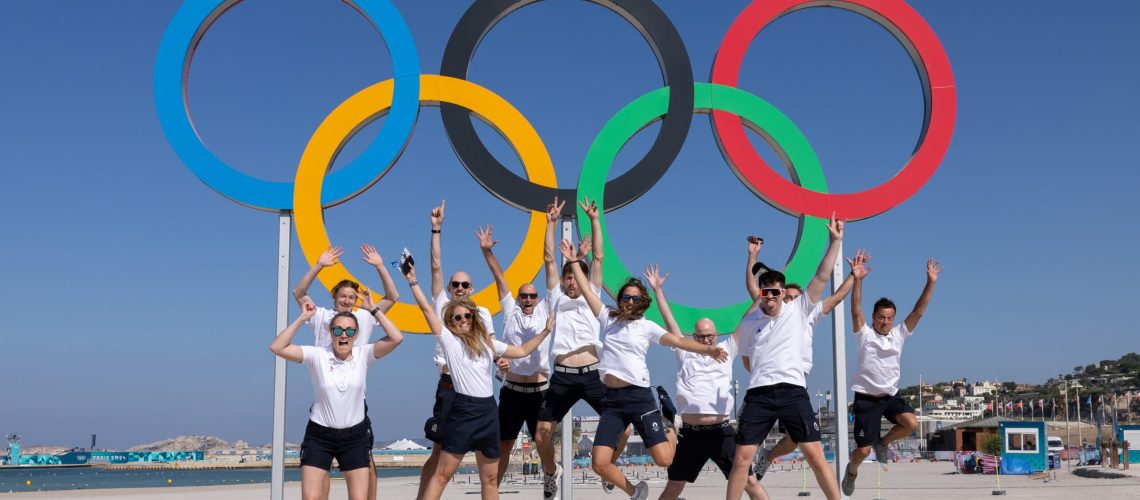How to go to the Olympic Games as an athlete without competing (but to work) and have many friends/acquaintances fulfilling their dreams without crying all the time in the process.
If you’ve come here to find out what Julia Castro (pronounced Yulia) did at the 2024 Paris Olympic Games, you’re in the right place. Let’s get started
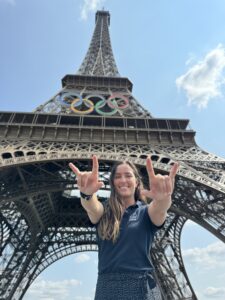
First of all, let me tell you that, for many years, I stopped expressing myself the way I wanted because some people wouldn’t stop telling me that I was too sensitive and that everything I wrote seemed to be written with sadness and just too much. Then there was a kind of administrative silence where I limited myself to publishing what the algorithm wanted without expressing my personal opinion.
Little by little, the opportunity to be a Community Manager appeared, which now looking back, was a great opportunity to express all my sensitivity through the sporting events I managed. And I believe this was one of the things that led me to Paris 2024 with World Sailing (the International Sailing Federation). So, if you’re sensitive, then be sensitive and let others say whatever they want!
How did I get to the Olympics?
Let me start from the beginning.
I’ve always liked technology since I was little.
At home, we had toy computers and other electronic gadgets that fascinated me. I spent hours drawing on my father’s computer Paint program or tinkering, trying to see what could be done with those square machines. Back then, there was no YouTube, so you had to figure things out on your own.
During high school, social networks already existed but, obviously not as we know them now. At that time, I was very clear that I wanted to do something related to sports and communication (something my physical education teacher didn’t like at all, as he was convinced that I had the perfect profile to study Physical Education and Sports Sciences).
Instead of going directly to university, and wanting to pursue my dream of becoming a professional kitesurfer, I moved to San Fernando (Cádiz) to study a higher degree in Physical and Sports Activities Animation, as I couldn’t find any “communication” program that I liked.
At that time, I didn’t have a penny to my name (not that I have much now either) and I dedicated myself to telling my adventures of how I was trying to become a professional kitesurfer on Facebook. I saw that my little stories had an interesting number of followers and people who liked what I was sharing, and that’s how my life in social media began.
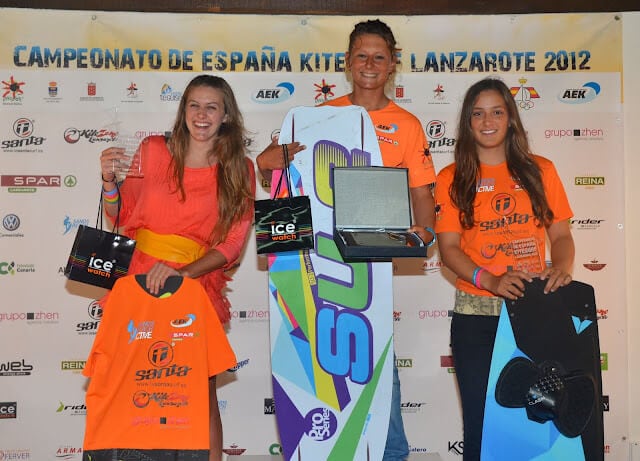
In 2017, I was on a plane heading to the CableWakeboard World Cup in China and ended up sitting next to the president of the European CableWakeboard Federation. We had many hours of travel ahead, and we started talking about various topics until we got to the subject of marketing and communication. He mentioned that they had a problem because they didn’t have anyone to handle this for them, and almost as if it were yesterday, I replied, “Hey, I communicate and do social media for myself, I could try it for the federation. In the end, it can’t be too different.”
A few months later, I was managing the European and African Championships at just 23 years old. I ended the week in the hospital urinating blood from stress. But I learned a lot.
From there, it was all word of mouth. I kept sharing what I was doing, people saw it, and they started calling me for various events. Up until 2020, practically, I had worked on kitesurfing, wingfoil, cable wakeboard, wakeboard, water skiing, parties events... If you click here, you can see all the events I’ve worked on.
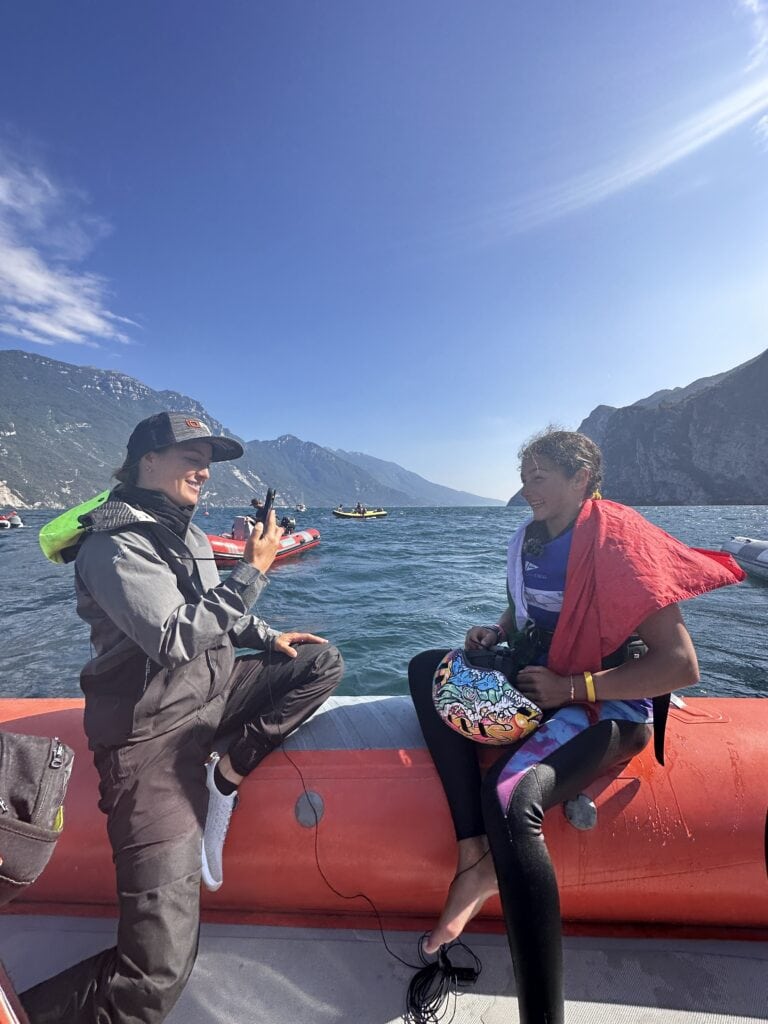
And how did I start working at Sailing events?
It was the “post-COVID” era. We still had to wear masks and I think we had just finished with the curfews when I received a call from Nolo, with whom I had already done some kite events around the islands.
"Hey, are you in Fuerteventura? What are you doing next week? There's a pre-Olympic sailing event in Lanzarote, at Marina Rubicón. Would you like to come and manage the social media?"
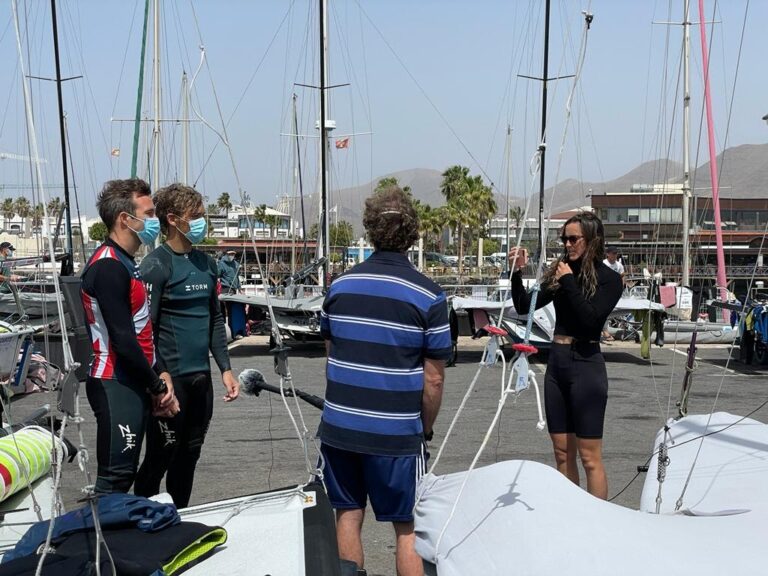
I’m not afraid to admit that I had no idea about sailing. But fear was never my thing, and I dove right in. The event was nothing less than the last chance to secure 3 “tickets” for the Tokyo Olympics in the 49er, 49er FX, and NACRA 17 classes. I had never seen a 49er in my life, but we were lucky to have one of the world’s best sailing photographers at the event, Jesus Renedo from Sailing Energy, who helped us all immerse ourselves in everything related to sailing.
All the stories he told us, the passion I saw in his eyes when he talked about those boats, and everything I experienced that week made me fall in love with sailing.
Luckily, it seems we did something right at that event because that was what later propelled me to reach the Games, having worked for major events and disciplines along the way (the Princess Sofia Trophy in Mallorca, Hyeres, the Copa del Rey, the Fastnet, the Rolex Sailor of The Year, 470, iQFOiL…)
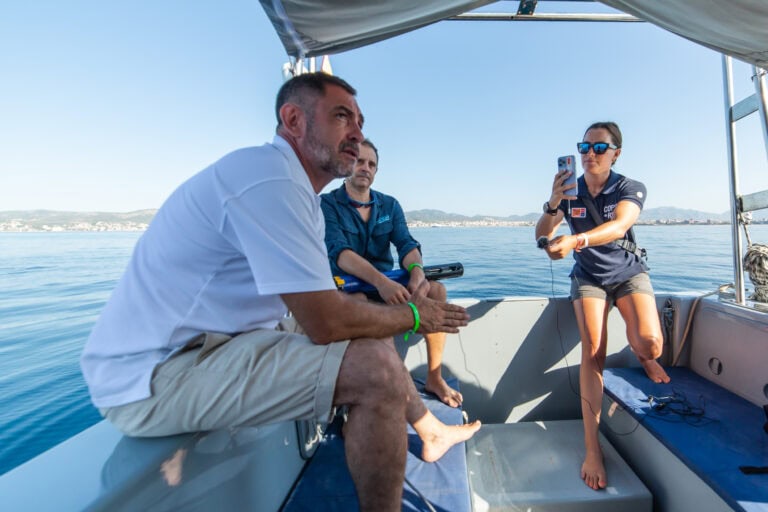
And how was Paris?
Here’s the English translation:
WELL, INCREDIBLE!!
I came to the Games to work with the International Sailing Federation, formerly called ISAF and now World Sailing (practically all federations in the world are called World + xxxxx to unify and make it easier to find federations and know which ones are official and which are not).
It’s still hard to explain my feelings. Working at my first Olympics is simply a dream come true. I loved every second.
Well, to begin with, sailing at the Paris Olympic Games was a “satellite event,” meaning that, like some sports such as certain football and basketball matches, etc., it takes place in other cities.
We ended up spending 17 days in the city of Marseille. I must admit that there wasn’t even half the decoration as in Paris, but well, we accept a boat as an aquatic animal. We were also more than 10 degrees different from Paris, every day over 30 degrees, well, lots of water and sweating like chickens but…
We also had the bad luck that the famous French Mistral (strong and gusty offshore wind) only made an appearance for one day… So there was very little wind and many races had to be cancelled. Well, quite a communication challenge! Overall, I’m extremely happy because I had several functions and was able to carry them all out. In the end, I feel like I’ve been “training” at other events over the last three years, so I arrived at the Games with a clear understanding of things. Seeing people you know and friends achieve their dreams, and being in charge of telling their stories is amazing. I’ve said it many times, but I spent two weeks with goosebumps and tears in my eyes. Excited, grateful, trying to enjoy every moment despite the craziness that the Games are and how frantic they can be. I would do it a thousand times over, and I hope the opportunity comes again.
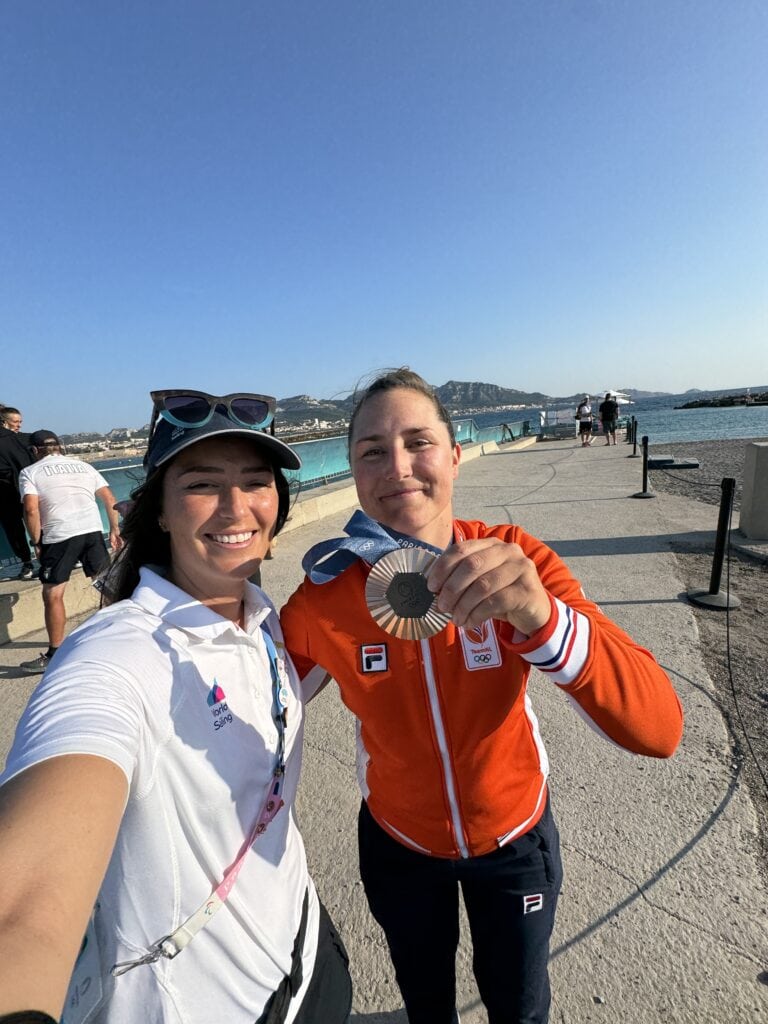
Express visit to Paris
It wasn’t in the established plan, but I decided to go to Paris on my own a few days before the event started, to be able to see “the real games.” Additionally, I took advantage of the opportunity and we made a video for Relevo that has already garnered over 66,000 views. And… somewhat unintentionally, the World Sailing team and I came up with the idea of making a small parody video about “where is sailing in the Paris Olympics” and… More than 500,000 views!
So, I think it was worth it. I rushed to Marseille and we started the Games there, where some football matches were also held.
The team
At World Sailing, there are many people who work continuously to ensure that sailing in the world functions in the best possible way. Here, I’m going to refer to the communication team, which I’m super proud to be a part of. Communicating about the games is not easy, and it would have been normal to have some conflicts at some point, but we made a great team and were able to successfully manage a very different Games from a communication perspective. The communication team:
- Scott Dougal. Digital Communications Director.
- Tom Roberts. Content director.
- Lewis Smith. Digital Communications lead.
- Claire Boyd. Director of Partnerships.
- Andy Rice. Writer
- Stefan Frost. Writer
- Lucy Stewart. Photo editor
- Mark Lloyd. Photography
- Sander van der Borch. Photography
- Jean-Louis Carli. Photography
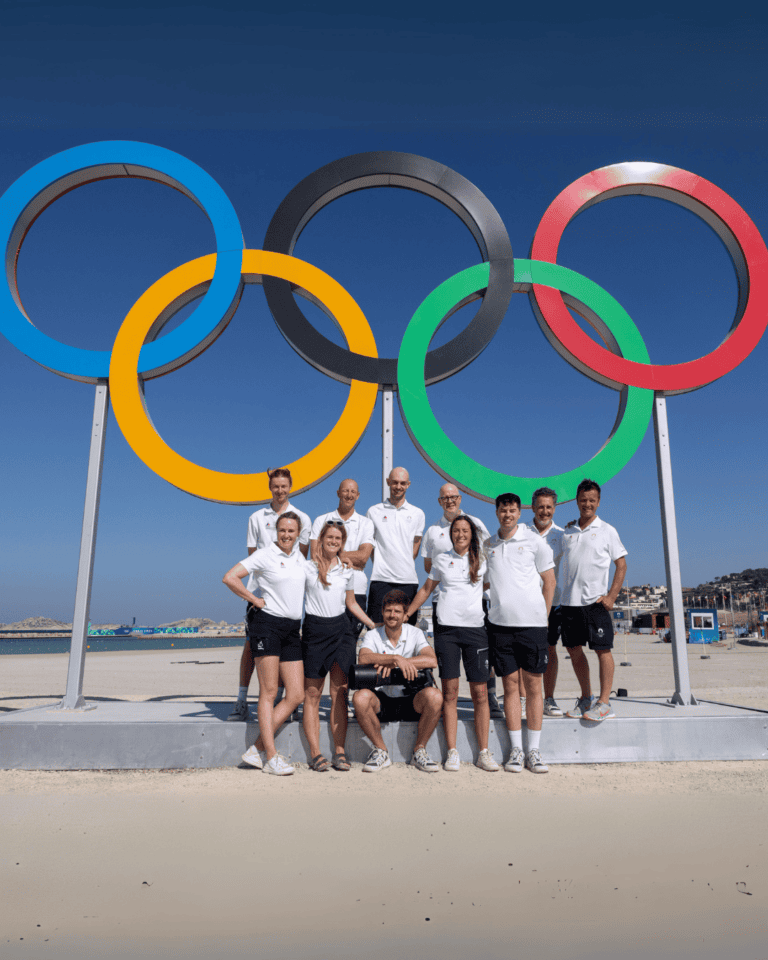
The best and worst moment
I have many best moments! I’ll list some, and note that they’re not in order of priority:
- Seeing myself there at the Games, with my accreditation and official work clothes. Absolutely incredible.
- Watching my friend Annelous win a bronze medal in kite… Oh my goodness!!!
- The 470 medal, although it was also very sad because Jordi and Nora didn’t get their medal, but it was a tremendous joy to see Lara and Lukas winning gold. Plus, it was the first gold medal Austria had won in 20 years!!
- The dinners, moments, and laughs with colleagues. Each and every one of them. Exhausted, sweaty, but with a smile on our faces.
- Spain’s first gold medal from Diego and Flo in 49er… How cool to be able to report on it!
- The amazing atmosphere every day in the spectator area.
- The morning and afternoon videos with Andy, some days were harder, other times the words flowed naturally but… Having this incredible professional by my side helping me was amazing.
The bad moments, of course, there are always bad ones, it’s almost impossible not to have them… But I’ll focus on one, about which I want to reflect.The comments. I was in charge of reading and managing the comments on the federation’s social media, and you’d think that during the games people would be focused on congratulating the competitors… Well, yes, but I also read many hate messages of all kinds and on many topics. People behind their phones are very brave and forget that these comments are read by people, not robots. People like you and me. I had a super low day after reading so much hate, but then it passed. But well, let’s see if we can think a bit more about the consequences of our actions.
Plans for the future
Although several weeks have passed since the Olympics, I’m still trying to enjoy how incredible they were and not think too much about the future, although I can’t help it and feel I’m in a position where I have to… I’m considering returning to competition, kite and wingfoil waves, since both disciplines are done simultaneously. I’m also thinking about competing again in the KPL (Kite Park League), where I was world runner-up in 2018… And combining it with my work as a community manager (or Swiss Army knife of events).
I want to make more videos about water sports on social media, mostly to be able to show others how incredible these sports are and that girls can practice them too. There’s a possibility of carrying out my first mixed kite camp (until now I always did them only for women) in a dream location and… Well, those are the ideas I have right now. For now, I need to sit down with my current sponsors and new sponsors to see which direction to take, together.
Thanks for reading, we keep fighting
I wanted to end with another small reflection.
- Sometimes it’s easy to forget where you come from and stop being grateful
- Coming from a small place doesn’t mean you’re condemned to do small things
- Every day when I woke up, I thought: Thank you, thank you, and thank you. I tried not to overlook anything, to greet as many people as possible every day… Well, to be amazed as much as possible by the experience that life was giving me and that I had worked so hard for. Often, when we are where we are, we forget where we came from and how much it cost us to get there. We get used to it and suddenly our big dreams become small, don’t let that happen.
- I was born in Puerto del Rosario and raised in Morro Jable, a town in the south of an island in the middle of the Atlantic and, for those who weren’t born on a smaller island, it’s hard to imagine how many fewer opportunities we have simply compared to our neighboring islands, let alone the mainland. That’s why I encourage those who have made it to the end, not to give up, no matter how small the town they come from. I invite them to dream big, because you already have the ‘no’, so why not try?
Thank you very much for reading this far. See you in the water.
